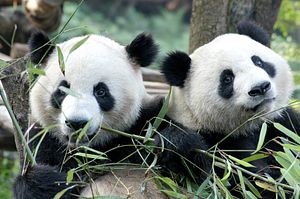Some China links to carry you through to the weekend:
China-Malaysia relations have suffered their first casualty in the wake of the disappearance of Flight 370. South China Morning Post reports that two pandas that were supposed to leave for Malaysia on April 15 will not be making the trip just yet. The two pandas, female Feng Yi and male Fu Wa, were supposed to represent the flourishing of China-Malaysia ties on the 40th anniversary of the establishing of diplomatic ties between Beijing and Kuala Lumpur. According to SCMP, Chinese officials decided to delay delivery of the pandas as a gesture of respect for the passengers (including over 150 Chinese), crew, and family members. The pandas, according to China’s embassy in Malaysia, will arrive “appropriate time in the near future”—possibly after the search from Flight 370 concludes. For now, though, China has decide it’s not the right time for panda diplomacy.
The panda delay is the first sign that the “China-Malaysia Friendship Year” might take a hit from the Flight 370 incident. However, as CNN reported earlier this week, both Chinese and Malaysian officials have been taking pains to emphasizes their ties are as healthy as ever. China’s ambassador to Malaysia even dismissed complaints from family members of Chinese passengers aboard Flight 370, saying the Chinese government and Chinese people did not share those “radical views.” Experts interviewed by CNN agree that bilateral trade especially is unlikely to be affected, outside of a possible dip in Chinese tourism to Malaysia.
In other news, the roughly three-week long occupation of Taiwan’s Legislative Yuan by student protestors ended Thursday. The protestors left the LY after receiving assurances from legislative speaker Wang Jin-pyng that several of their key demands would be met. In case you missed it, J. Michael Cole reported from Taipei on the students’ departure from the LY—and their promise to continue the fight in the political arena. Meanwhile, two of The Diplomat’s contributors offered their perspectives on what the Sunflower Movement meant. Dingding Chen argued that the protestors will fail to achieve their ultimate goals. Yang Hengjun, on the other hand, wrote that the Sunflower Movement was part of a long history of popular protests, both in Taiwan and elsewhere, and would help Taiwan’s democracy mature.
Over at Wall Street Journal’s China Real Time blog, the writers did an analysis of hourly air quality readings taken in Beijing since 2008. The over three years’ worth of data, gathered by the U.S. Embassy in Beijing, was posted online by the State Department. While the data is not intended to be representative of pollution levels across Beijing (it only monitors the air quality at the Embassy location), CRT noted several trends apparent in the date. One of the most interesting tidbits is that PM2.5 levels aren’t actually any worse than they were in 2008, despite the fact that Beijing’s smoggy days receive far more attention in 2014 than they did six year ago. The data also indicates that Chinese New Year fireworks do have a real effect on air quality—each year pollution spikes just before and after midnight on the holiday.
Finally, for those interested in American football and/or Chinese sports culture, Christopher Beam over at New Republic has a fascinating long-form story on his time spent with the Chongqing Dockers, an amateur football team. Beam examines what motivated a group of Chinese men to try this peculiarly American sport, and along the way uncovers some of the players’ basic assumptions about masculinity, American culture, and modern Chinese life.

































